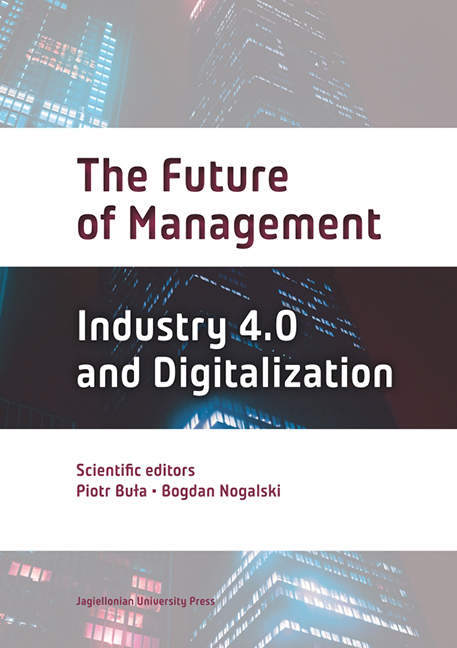Book contents
- Frontmatter
- Contents
- Preface
- Industry 4.0: Social Impacts and Operations Management Challenges
- Business Model Changes in the Presence of Challenges Brought by Industry 4.0
- Communication in Traditional and Network Organisation: Transformation
- Consequences of the Fourth Industrial Revolution in Social and Economic Development in the 21st Century
- Ideology, Trust, and Spirituality: A Framework for Management Control Research in the Era of Industry 4.0
- Renewable Energy through Industry 4.0 on the Example of Photovoltaic Development in Selected European Countries
- Employee Loyalty in the ICT Sector as a Challenge for Building Industry 4.0
- The Importance of Flexibility of Human, Tangible and Intangible Resources in Selected Production Entrepreneurships: Results of Empirical Research
- Challenges Posed for Universities by the Industry 4.0 Environment
- Big Data in Managing Marketing Communication
- Mathematical Risk Assessment Method in the Implementation of Logistic Processes
- Management and Digitisation
- Branding of Time as a New Direction in Tomorrow’s Management
- The Future of Branding
Consequences of the Fourth Industrial Revolution in Social and Economic Development in the 21st Century
Published online by Cambridge University Press: 16 November 2021
- Frontmatter
- Contents
- Preface
- Industry 4.0: Social Impacts and Operations Management Challenges
- Business Model Changes in the Presence of Challenges Brought by Industry 4.0
- Communication in Traditional and Network Organisation: Transformation
- Consequences of the Fourth Industrial Revolution in Social and Economic Development in the 21st Century
- Ideology, Trust, and Spirituality: A Framework for Management Control Research in the Era of Industry 4.0
- Renewable Energy through Industry 4.0 on the Example of Photovoltaic Development in Selected European Countries
- Employee Loyalty in the ICT Sector as a Challenge for Building Industry 4.0
- The Importance of Flexibility of Human, Tangible and Intangible Resources in Selected Production Entrepreneurships: Results of Empirical Research
- Challenges Posed for Universities by the Industry 4.0 Environment
- Big Data in Managing Marketing Communication
- Mathematical Risk Assessment Method in the Implementation of Logistic Processes
- Management and Digitisation
- Branding of Time as a New Direction in Tomorrow’s Management
- The Future of Branding
Summary
Abstract
The article is devoted to the essence, manifestations and the economic consequences of the Fourth Industrial Revolution as well as the difficulty to assess ensuing social results of the artificial intelligence. It also analyzes the practical manifestations of the foregoing in some countries, including Poland. The chapter titles of this paper are the following: The stages of Industrial Revolution, The significance of the Fourth Industrial Revolution, The implementation of the Industrial Revolution, The challenges of artificial intelligence, The economic and social effects of the Fourth Industrial Revolution.
Keywords: industrial revolution, artificial intelligence, economic effects, social effects, economic development
Introduction
Industrialisation has become a major factor for the social and economic development and the progress of civilisation, exerting an impact on the structural changes in the economy and social life. Industrialisation processes are closely intertwined with the changes in the organisation, legal status and property of various types and forms of enterprises and instruments used in the management of economy. In the 1970s, the growing importance of relationships between the enterprises and the environment and the necessity of extending the time of planning development have resulted in the emergence of strategic planning. The principles of crisis management which were formulated in the early 21st century, responded to the increasing turbulences within the environment of enterprises.
Industrialisation and the technical progress in the industry determine raising the standard of living not just through the supply of modern and relatively cheap products, but also through the growing services sector. This is because in line with the development of processing industry, the services sector has increased employment in the economy and generated a higher GDP. This, in turn, has brought a new look at the structure of the economy and the role of the industry in its development, which has resulted in the concept of a post-industrial society and the dawn of the post-industrial era followed by the onset of the servitisation phase, i.e. the superiority of services over other economic sectors.
However, it turned out that deindustrialisation cannot be carried too far as many service providers are not able to operate without being supplied with the new industrial goods.
- Type
- Chapter
- Information
- The Future of ManagementVolume Two: Industry 4.0 and Digitalization, pp. 60 - 71Publisher: Jagiellonian University PressPrint publication year: 2022



